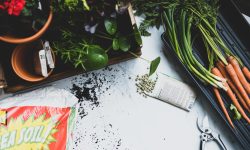We are head over bread about our newest Edmonton Bakery, Boulangerie Bonjour, because they stick to their morals. What they do is simple. They reduce food mileage, encourage local farming, and have the tastiest bread in town.
We asked Yvan why their business is sustainable, what they source locally, and how they are making an impact. Read below for Yvan’s response.
“There are many areas in a bakery where waste can be controlled, some are more and some are less obvious than others. It’s easy for us to see the cost and potential waste of unsold bread at the end of the day, after all, there is a direct monetary consequence. What is often overlooked by bakers, is waste that we cannot see directly but is just as important. For us, one of our greatest challenges is not diminishing all other forms of waste (environmental, economic etc..), but is the waste of taste and grain nutrients.
 We choose to stone mill our whole wheat, rye and barley flour right here in our bakery with grains purchased from local farmers. This helps us ensure that the flour is used within a few days of being milled so that its nutritional content and fresh taste is not wasted and lost. We use many heritage grains varieties, Red Fife and Marquis from Heritage Harvest in Strathmore, Alberta and others. Buying grains from local organic farmers also helps tremendously reduce transportation waste and all of its associated pollution.
We choose to stone mill our whole wheat, rye and barley flour right here in our bakery with grains purchased from local farmers. This helps us ensure that the flour is used within a few days of being milled so that its nutritional content and fresh taste is not wasted and lost. We use many heritage grains varieties, Red Fife and Marquis from Heritage Harvest in Strathmore, Alberta and others. Buying grains from local organic farmers also helps tremendously reduce transportation waste and all of its associated pollution.
In order to further improve, we have recently purchased a new European stone mill from Austria which will give us the ability to whole-mill all of our flours and keep all of its minerals and vitamins. From our baguette flours to nutritious whole grains used in our traditional Pain au Levain (sourdough bread).
Wasting food is a moral as well as an economic problem, I would go further and say that wasting our ingredient’s nutrients and good taste by shortcutting the processes involved in making bread is just as problematic in the long run. Reducing waste must start at the very beginning of our bread production, for us milling our grains.”











